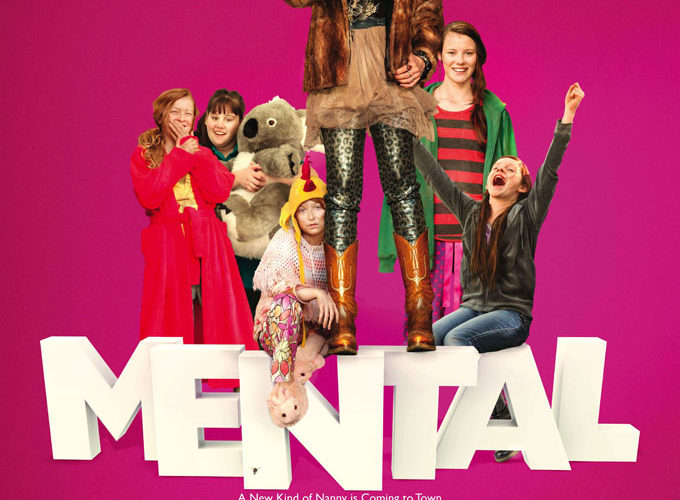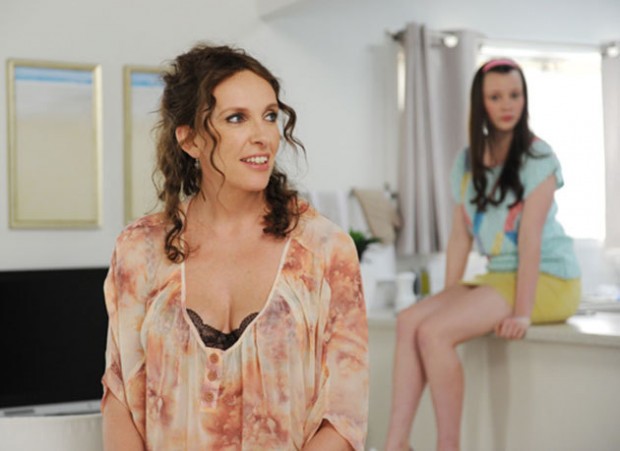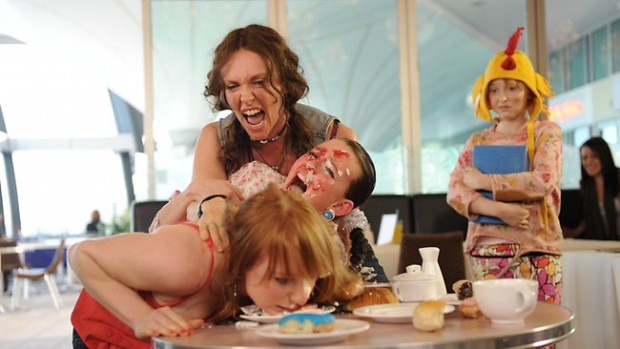In P.J. Hogan’s new screwball comedy Mental, the hills are alive with the sound of pathos. The movie may open with Rebecca Gibney having a mentally divergent song and dance number where she channels Julie Andrews, but the rest of this appealing-if-hyperactive mess is equally haunted by those chirpy Von Trapp children. The Sound of Music is as much an anthem for the troubled and offbeat Moochmore clan as the songs of Abba were for the titular character in Hogan’s breakout movie, Muriel’s Wedding. The highlight of Mental, like Wedding, is Toni Collete, whose deranged nanny gives the whole film a pleasingly daft sincerity it would not have otherwise.
Collete is Shaz, a boorish ragamuffin who conceals knives on her person, gets high on the job and suggests an arcane blend of Nanny McPhee and Drop Dead Fred. None of this stops her from being hired by Barry (Anthony LaPaglia) the mayor of Dolphin Heads, Queensland to watch after his five daughters when his wife Shirley — the Andrews impersonator — is committed to a psychiatric hospital. Shirley may have gone over the deep end but her husband’s infidelity likely played a large part, as did the lot of psyche taxing children, Coral (Lily Sullivan), Michelle (Malorie O’Neill), Leanne (Nicole Freeman), Kayleen (Chelsea Bennett) and Jane (Bethany Whitmore).
Shaz is hiding–none too well, I might add–her own share of unstable baggage but she comes into the Moochmore house to help straighten up the disarray left in the wake of mum losing her marbles. There’s a fair bit of work to do here too; each of the girls fancies themselves the victim of a different mental illness. The meat of the film is intended to be Shaz’s reinvention of the five Moochmore ladies, and these sections are legitimately funny and emotionally disarming. Of course, there’s more going on with these kids than just neurotic behavior.
Instead of being whisked away from a system that’s forced them to be outcasts—the lock-step death march of suburban living—Shaz shows the girls how to assert themselves and reclaim lives spiraling from their control, instigated by convincing them that they are a special next step in human evolution. Part of this process is aimed at the tense relationship all of them have with LaPaglia’s Barry, whose adultery and negligence have taken a heavy toll on the family in general. But what about Shaz? Her real agenda for being in Dolphin Heads goes far behind playing Maria VonTrapp for the Cuckoo’s Nest, and the third act is a schizophrenic roller-coaster of compassion and absurdity.
Hogan has insisted in interviews that part of this story is autobiographical, and that his father did indeed hire a nanny that turned out to have been a previous mental patient. If that part is accurate, it still doesn’t qualify Mental as a true story, because the world built around that anecdote is as fictional as Hogan’s last theatrical venture, Peter Pan. In fact, the eye-popping bubblegum color scheme sets Mental and its characters apart from the real world, suggesting a demented children’s storybook. The gusty whimsy of Muriel’s Wedding transforms into a cotton-candy hurricane of goofy Aussie stereotypes, clichéd dramatic beats and crude but clever visual gags, including bright-red menstrual blood liberally dumped over the austere white of an immaculate home.
While part of the fun to be had with a movie like this is trying to figure out which characters fall on the side of normal or crazy, Hogan’s vision suggests the whole town of Dolphin Heads has caught the first shuttle to the Moon. The actors are up to the insanity, and Gibney and LaPaglia each hit the right notes to add a shade of tenderness to their ruptured marriage. The young actresses giving life to the Moochmore girls have been creatively cast and have a wonderful time focusing in on the silly little details that Hogan has left for them. Liev Schreiber as the shark hunter is obviously enjoying himself and Kerry Fox, the pesky OCD neighbor, takes suburban hysteria to a whole new level.
Still, Hogan knows that this is Collette’s movie, and when her Shaz sweeps in like a Tasmanian Devil and devours the narrative furniture, it doesn’t feel haphazard, it feels intended. One of the most physically immersive and charming female actors we have right now, Collette is a perfect fit for an unmade bed like Shaz. Not because she’s a similar lost soul, but because as a performer she’s so comfortable in her own skin she can take leaps that the less assured would stumble over. She transforms the movie from a stop-and-go lark to a successful comedy, one that has just enough heft to justify its fast-and-loose portrayal of mental illness. Like Shaz, Mental is hectic and (mostly) unpredictable, but it’s also lovable and forthright in its way, and promises to leave you feeling better than when it found you.
Mental is now in limited release.



